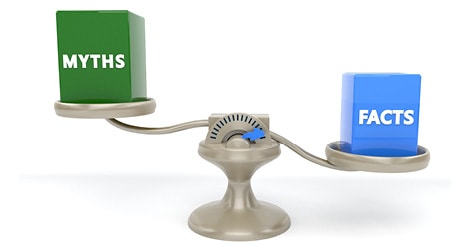SEO trends can seem ever-changing, and staying up-to-date on them can be challenging. With new technological advances like voice search and artificial intelligence breaking into the industry, even veteran marketers are sometimes left scratching their heads.
Here are a few popular myths to be aware of in modern search engine optimization.
Myth 1: You Should Fear Google’s Wrath
As a marketer or business owner, you should already have a Google My Business listing to improve local SEO. By creating a listing, there are a variety of guidelines (set in place by Google) to which you automatically agree to adhere.
Many believe that failure to adhere to these guidelines means an instant penalty, which can be costly to a business’s marketing strategy. In reality, one of two things could happen, depending on severity.
The first is a soft suspension. With this, you’ll no longer have the ability to manage your business’s reputation via Google My Business. However, your listing itself will remain unaffected. Second is the possibility of a hard suspension. That means your business listing gets erased entirely. With no listing, you won’t be able to rank in local search results.
Should you follow Google’s guidelines? Yes. But making a few mistakes along the way doesn’t mean instant defeat.
Myth 2: Link Building = Bad
This myth came about because, in the past, building as many links as possible, without analyzing the linked content, was how marketers improved search engine ranking. That led to the inclusion of many unnecessary and irrelevant links. When Google implemented a new penalty targeting bad links, many took this to mean that all link building was bad.
Building links is still a significant factor in search engine optimization. Marketers even consider it one of the top four ranking factors in SEO. Now, though, links must be relevant and provide additional quality to what you already offer.
Myth 3: Social Media Doesn’t Matter
It’s true that Google doesn’t look at specific social metrics, like the number of Facebook likes you’ve received or how many of your tweets get retweeted. However, social activity generally boosts your SEO strategy in a variety of ways:
- Increased website visits
- Higher rates of engagement
- Wider content distribution
- More influencers visiting content
- Increased links and sharing
Should social media be your only SEO strategy? No. But it will help boost your current efforts.
Myth 4: No One Cares About Meta Tags
Meta tags are HTML tags that appear between the opening and closed <head> tags. They’re used to enhance the preview snippets that appear in search results.
The three elements of a meta tag are:
- The Title Tag
- The Meta Description
- Meta Keyword or Phrase
Similarly to utilizing social media, meta tags don’t inherently boost your search engine ranking. But they do help tell users and search engines what your site is about, making it easier to index and rank. Meta tags also make your search results more attractive, attracting more clicks.
Myth 5: All Pop-Ups Are Evil
One prevalent SEO myth is that all pop-ups are evil. Every. Single. One.
In reality, pop-ups are great for generating leads, gathering feedback, and acquiring subscribers. Many marketers incorporate form pop-ups into their website because of those reasons. But the misuse of pop-ups has created a well-known stigma.
Back in 2017, Google rolled out a new penalty for what the firm calls “intrusive interstitials.” If you’re a marketer, the word you should be focusing on is “intrusive.” Google does not penalize all pop-ups, only the ones that sacrifice user experience.
A good rule to follow is this: if it’s annoying, get rid of it.
Myth 6: Use Lots of Keywords
Incorporating keywords can be tricky for marketers with little SEO experience. Once you’ve performed your keyword research, there are two rules to keep in mind.
One: keywords don’t need to be repeated verbatim. Use keywords in natural ways that make sense to the content you’re creating and the audience you are targeting.
Two: don’t attempt keyword stuffing, which means trying to use as many keywords on a page as possible. That will not increase your search engine ranking. Google now tags this type of content as spam or “bad content,” usually hurting your SEO efforts.
Don’t focus on the keywords. Instead, focus on creating quality content.
Myth 7: More Pages Are Better
You may think that when it comes to your website, the more pages, the better. It’s an opportunity to create content and incorporate more keywords, right?
Creating excessive pages will not help your search engine optimization. Similar to link-building, creating pages merely to include more content isn’t enough to improve rank. The material still needs to be of high-quality and offer something valuable to readers.
Ultimately, SEO is all about trial and error. It’s about trying to figure out what consumers want, even when they may not know precisely what that is. But the more you learn from those who’ve already failed, the further you can grow your success.








